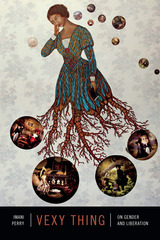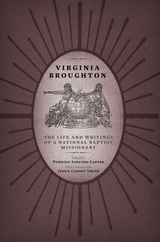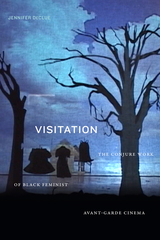5 start with V start with V



For more than half a century, Virginia E. Walker Broughton (1856–1934) worked tirelessly to uplift black communities, and especially black women, throughout Tennessee. Born into an elite African American family in Nashville, she began her professional career as a teacher and later became one of the most prominent domestic missionaries in the National Baptist Convention, U.S.A., as well as an accomplished speaker and writer. This annotated collection is the first scholarly work devoted entirely to Broughton’s life and writings.
The book for which Broughton is best known, Twenty Year’s [sic] Experience of a Missionary, was an autobiography first published in 1907 and reprinted in 1988 as part of a scholarly edition of spiritual narratives by black women. Recently, in the archives of Fisk University, Broughton’s alma mater, Tomeiko Ashford Carter discovered an earlier autobiographical work, A Brief Sketch of the Life and Labors of Mrs. V. W. Broughton, Bible Band Missionary, for Middle and West Tennessee, which was distributed at the famous Atlanta Cotton States and International Exposition of 1895. While both autobiographies portray Broughton as an important religious figure for whom missionary work became a saving grace, Life and Labors is more revealing of key facts about Broughton and her family, and it situates them more clearly among the nation’s black elite. This volume not only brings Life and Labors back into print but also collects various other pieces Broughton produced during her long career.
Among those other writings is a 1904 booklet titled Woman’s Work: As Gleaned from the Women of the Bible, and the Bible Women of Modern Times, which recognizes the prominence of the female in Christian theology and shows how Broughton anticipated the work of present-day feminist and womanist theologians. Several “training course” articles that Broughton wrote for a National Baptist newspaper, covering such topics as the Christian deportment of women and the need for black spiritual literature, are also gathered here, as are a program she devised for systematic Bible study and a brief article, published just a few years before her death, in which she describes some of her missionary field work. Complementing these primary materials are an extensive critical introduction and notes by Carter, a Walker-Broughton family tree, and a chronology of Broughton’s life.
As this collection makes clear, Virginia Broughton was strongly committed to making the work of black religious women an ongoing intellectual enterprise. In these pages, she emerges as both a dedicated missionary and a formidable religious scholar.

Duke University Press Scholars of Color First Book Award recipient

important African-American war correspondent of his era, served in the
famed black Fifty-fourth Massachusetts Regiment, subject of the film Glory.
His letters from the front, published in the New York Weekly Anglo-African,
brilliantly detail two wars: one against the Confederacy and one against
the brutal, debilitating racism within his own Union Army. Together with
Donald Yacovone's biographical introduction detailing Stephens's life
and times, they provide a singular perspective on the greatest crisis
in the history of the United States.
Stephens chronicled the African-American
quest for freedom in reports from southern Maryland and eastern Virginia
in 1861 and 1862 that detailed, among other issues of the day, the Army
of the Potomac's initial encounter with slavery, the heroism of fugitive
slaves, and the brutality both Southerners and Union troops inflicted
on them.
From the inception of the
Fifty-fourth early in 1863 Stephens was the unit's voice, telling of its
struggle against slavery and its quest to win the pay it had been promised.
His description of the July 18, 1863, assault on Battery Wagner near Charleston,
South Carolina, and his writings on the unit's eighteen-month campaign
to be paid as much as white troops are gripping accounts of continued
heroism in the face of persistent insult.
The Weekly Anglo-African
was the preeminent African-American newspaper of its time. Stephens's
correspondence, intimate and authoritative, takes in an expansive array
of issues and anticipates nearly all modern assessments of the black role
in the Civil War. His commentary on the Lincoln administration's wartime
policy and his conviction that the issues of race and slavery were central
to nineteenth-century American life mark him as a major American social
critic.
READERS
Browse our collection.
PUBLISHERS
See BiblioVault's publisher services.
STUDENT SERVICES
Files for college accessibility offices.
UChicago Accessibility Resources
home | accessibility | search | about | contact us
BiblioVault ® 2001 - 2024
The University of Chicago Press









